Left-wing party funds Kurdish group in Syria

The Red-Green Alliance (Enhedslisten) on Friday donated over 50,000 kroner directly to Kurdish fighters battling the terrorist group Isis in northern Syria.
Enhedslisten MP Nikolaj Villumsen held a press conference with Saleh Muslim, the leader of the Syrian Kurdish Democratic Union Party (PYD), in Copenhagen on Friday afternoon in which he presented Muslim with a check for 53,500 kroner ($9,000). Villumsen said the donation was needed to help the “desperate situation” faced by civilians in northern Syria. “For more than 14 days, [Isis] has carried out a violent attack on the city of Kobahni, which has more than 400,000 Kurdish and Christian residents. Here, the Islamic State has beheaded and killed civilians. Therefore we have taken the untraditional step of donating money to a Syrian party,” Villumsen told DR ahead of the press conference. EL's @Nvillumsen overrækker check på 53.500 kr. til Saleh Muslim, leder af kurdiske PYD. #dkpol pic.twitter.com/RQrzdhI4NV
— Steen A. Jørgenssen (@SteenAJ) October 3, 2014
Villumsen said that Enhedslisten would not seek any influence over how PYD chooses to use the money, and that he couldn’t deny that the money might go toward the purchase of weapons. The right-wing Danish People’s Party (DF) was critical of the move. “Enhedslisten is injecting money into an inflamed environment, where no one can tell friend from foe. It’s like throwing gasoline on the fire,” DF spokesman Søren Espersen told DR. Daniella Kuzmanovic, an expert on Turkey who teaches at the University of Copenhagen, said that PYD’s connection to the Kurdistan Workers’ Party (PKK) makes Enhedslisten’s move a risky one. PKK is listed as a terrorist organisation by both the EU and the US. “As long as PKK is on various terror lists, PYD will remain a problematic partner internationally because of its strong ties to PKK,” Kuzmanovic told Jyllands-Posten, adding that armed factions of the PYD are known to have received military training from the PKK. Enhedslisten was the only party to vote against Denmark's military action in Iraq.
Comments
See Also
Enhedslisten MP Nikolaj Villumsen held a press conference with Saleh Muslim, the leader of the Syrian Kurdish Democratic Union Party (PYD), in Copenhagen on Friday afternoon in which he presented Muslim with a check for 53,500 kroner ($9,000).
Villumsen said the donation was needed to help the “desperate situation” faced by civilians in northern Syria.
“For more than 14 days, [Isis] has carried out a violent attack on the city of Kobahni, which has more than 400,000 Kurdish and Christian residents. Here, the Islamic State has beheaded and killed civilians. Therefore we have taken the untraditional step of donating money to a Syrian party,” Villumsen told DR ahead of the press conference.
EL's @Nvillumsen overrækker check på 53.500 kr. til Saleh Muslim, leder af kurdiske PYD. #dkpol pic.twitter.com/RQrzdhI4NV
— Steen A. Jørgenssen (@SteenAJ) October 3, 2014 Villumsen said that Enhedslisten would not seek any influence over how PYD chooses to use the money, and that he couldn’t deny that the money might go toward the purchase of weapons.
The right-wing Danish People’s Party (DF) was critical of the move.
“Enhedslisten is injecting money into an inflamed environment, where no one can tell friend from foe. It’s like throwing gasoline on the fire,” DF spokesman Søren Espersen told DR.
Daniella Kuzmanovic, an expert on Turkey who teaches at the University of Copenhagen, said that PYD’s connection to the Kurdistan Workers’ Party (PKK) makes Enhedslisten’s move a risky one.
PKK is listed as a terrorist organisation by both the EU and the US.
“As long as PKK is on various terror lists, PYD will remain a problematic partner internationally because of its strong ties to PKK,” Kuzmanovic told Jyllands-Posten, adding that armed factions of the PYD are known to have received military training from the PKK.
Enhedslisten was the only party to vote against Denmark's military action in Iraq.
Join the conversation in our comments section below. Share your own views and experience and if you have a question or suggestion for our journalists then email us at [email protected].
Please keep comments civil, constructive and on topic – and make sure to read our terms of use before getting involved.
Please log in here to leave a comment.